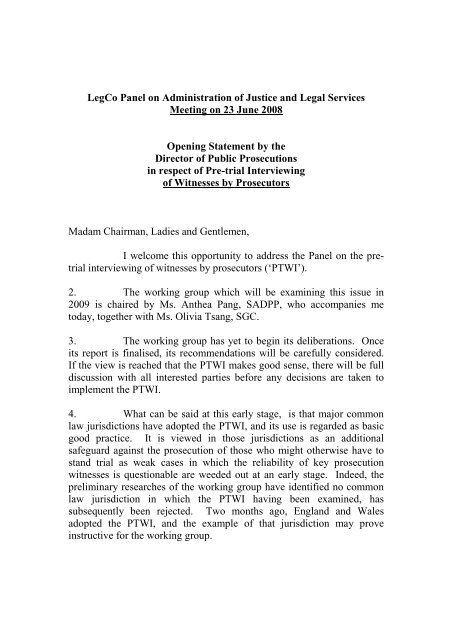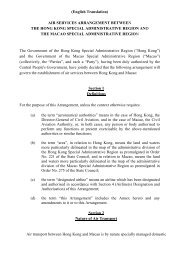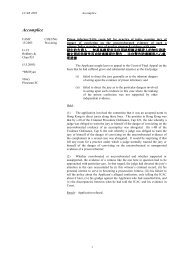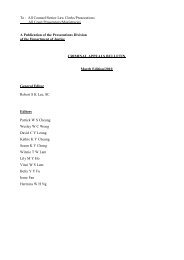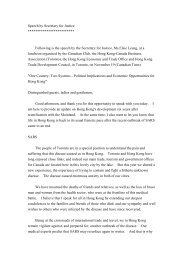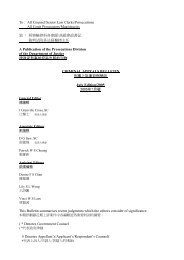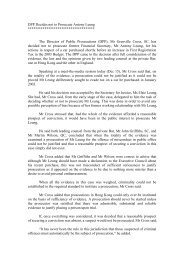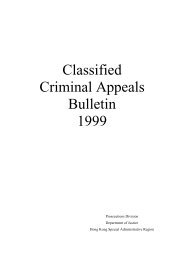Opening statement by the Director of Public Prosecutions, Mr I ...
Opening statement by the Director of Public Prosecutions, Mr I ...
Opening statement by the Director of Public Prosecutions, Mr I ...
Create successful ePaper yourself
Turn your PDF publications into a flip-book with our unique Google optimized e-Paper software.
LegCo Panel on Administration <strong>of</strong> Justice and Legal Services<br />
Meeting on 23 June 2008<br />
<strong>Opening</strong> Statement <strong>by</strong> <strong>the</strong><br />
<strong>Director</strong> <strong>of</strong> <strong>Public</strong> <strong>Prosecutions</strong><br />
in respect <strong>of</strong> Pre-trial Interviewing<br />
<strong>of</strong> Witnesses <strong>by</strong> Prosecutors<br />
Madam Chairman, Ladies and Gentlemen,<br />
I welcome this opportunity to address <strong>the</strong> Panel on <strong>the</strong> pretrial<br />
interviewing <strong>of</strong> witnesses <strong>by</strong> prosecutors (‘PTWI’).<br />
2. The working group which will be examining this issue in<br />
2009 is chaired <strong>by</strong> Ms. An<strong>the</strong>a Pang, SADPP, who accompanies me<br />
today, toge<strong>the</strong>r with Ms. Olivia Tsang, SGC.<br />
3. The working group has yet to begin its deliberations. Once<br />
its report is finalised, its recommendations will be carefully considered.<br />
If <strong>the</strong> view is reached that <strong>the</strong> PTWI makes good sense, <strong>the</strong>re will be full<br />
discussion with all interested parties before any decisions are taken to<br />
implement <strong>the</strong> PTWI.<br />
4. What can be said at this early stage, is that major common<br />
law jurisdictions have adopted <strong>the</strong> PTWI, and its use is regarded as basic<br />
good practice. It is viewed in those jurisdictions as an additional<br />
safeguard against <strong>the</strong> prosecution <strong>of</strong> those who might o<strong>the</strong>rwise have to<br />
stand trial as weak cases in which <strong>the</strong> reliability <strong>of</strong> key prosecution<br />
witnesses is questionable are weeded out at an early stage. Indeed, <strong>the</strong><br />
preliminary researches <strong>of</strong> <strong>the</strong> working group have identified no common<br />
law jurisdiction in which <strong>the</strong> PTWI having been examined, has<br />
subsequently been rejected. Two months ago, England and Wales<br />
adopted <strong>the</strong> PTWI, and <strong>the</strong> example <strong>of</strong> that jurisdiction may prove<br />
instructive for <strong>the</strong> working group.
2<br />
5. On 20 December 2004, Lord Goldsmith QC, <strong>the</strong>n Her<br />
Majesty’s Attorney General for England and Wales, issued his report on<br />
<strong>the</strong> use <strong>of</strong> <strong>the</strong> PTWI. In his introduction, Lord Goldsmith said :<br />
Many members <strong>of</strong> <strong>the</strong> public would be surprised to learn<br />
that in England and Wales prosecutors are not entitled to<br />
interview witnesses before trial, even when <strong>the</strong>y are key<br />
witnesses whose credibility may be critical to whe<strong>the</strong>r a<br />
prosecution should go ahead or not. The decision whe<strong>the</strong>r<br />
to go ahead is for <strong>the</strong> prosecutor. Yet he is not presently<br />
allowed, himself, to assess <strong>the</strong> reliability or credibility <strong>of</strong><br />
that witness’s evidence. Prosecutors in o<strong>the</strong>r countries<br />
would be similarly surprised.<br />
For it is striking that it is only in England and Wales that<br />
prosecutors do not have direct access to witnesses even in<br />
order to assess <strong>the</strong>ir credibility and reliability – even though<br />
<strong>the</strong>re is no reason why an impartial public prosecution<br />
service should not undertake this role. If my vision <strong>of</strong> <strong>the</strong><br />
CPS as a world class prosecuting service, admired and<br />
respected, and seen <strong>by</strong> all as a champion for victims and<br />
justice is to be realised, this must change.<br />
The prosecutor is in charge <strong>of</strong> <strong>the</strong> prosecution; it is for <strong>the</strong><br />
prosecutor alone to decide which evidential issues are<br />
significant and which require fur<strong>the</strong>r exploration. The<br />
responsibility for this is, rightly, placed in <strong>the</strong> hands <strong>of</strong> a<br />
qualified lawyer because it is recognised that <strong>the</strong>y are<br />
skilled in assessing evidence. However, at present,<br />
prosecutors are required to reach fully informed decisions<br />
about whe<strong>the</strong>r <strong>the</strong>re is sufficient evidence to proceed in a<br />
case – without it seems one essential element – <strong>the</strong> option <strong>of</strong><br />
speaking to a witness to assess <strong>the</strong>ir credibility and<br />
reliability, where it is considered necessary to do so.<br />
The public rightly expects prosecutors to prosecute criminal<br />
<strong>of</strong>fences, robustly, promptly and fairly and to bring to trial<br />
only those against whom <strong>the</strong>re is an adequate and properly<br />
prepared case (and whose prosecution is justified in <strong>the</strong><br />
public interest) and that prosecutors have confidence in <strong>the</strong><br />
reliability <strong>of</strong> <strong>the</strong> evidence. Logic dictates that this
3<br />
expectation can only be met if prosecutors are able to<br />
interview witnesses about <strong>the</strong>ir evidence before trial.<br />
I have <strong>the</strong>refore concluded, for <strong>the</strong> reasons set out in this<br />
paper, that <strong>the</strong> position ought to change so that prosecutors<br />
should have <strong>the</strong> ability in <strong>the</strong> future to interview witnesses.<br />
6. Thereafter, a pre-trial witness pilot was conducted in<br />
nor<strong>the</strong>rn England, and this was adjudged a success. On 27 November<br />
2007, Baroness Scotland QC, Lord Goldsmith’s successor as Attorney<br />
General for England and Wales, announced that henceforth prosecutors<br />
would have <strong>the</strong> opportunity to interview key witnesses about <strong>the</strong>ir<br />
evidence. She explained that <strong>the</strong> interview itself was designed to address<br />
three key purposes :<br />
<br />
<br />
<br />
To assess <strong>the</strong> reliability <strong>of</strong> <strong>the</strong> witness’s evidence<br />
To assist <strong>the</strong> prosecutor in understanding complex evidence<br />
To explain court process and procedures.<br />
Baroness Scotland said :<br />
I am pleased to be announcing <strong>the</strong> national roll out <strong>of</strong><br />
something that I truly believe will make a difference to<br />
streng<strong>the</strong>ning cases, and play its part in improving witness<br />
support throughout <strong>the</strong> trial process. We have already made<br />
great progress across <strong>the</strong> criminal justice system since 2002<br />
but this roll out, following <strong>the</strong> successful pilot, represents yet<br />
ano<strong>the</strong>r step in our journey towards making <strong>the</strong> trial process<br />
<strong>the</strong> best it can be. I am particularly confident that this<br />
change in policy will be extremely valuable in cases where<br />
<strong>the</strong>re are vulnerable witnesses.<br />
7. In consequence, <strong>the</strong> PTWI was adopted throughout England<br />
and Wales from April 2008.<br />
8. The introduction <strong>of</strong> <strong>the</strong> PTWI represents an important<br />
change in <strong>the</strong> prosecution service in England and Wales. Like <strong>the</strong>ir<br />
counterparts in o<strong>the</strong>r common law jurisdictions, prosecutors in that<br />
jurisdiction can now ask witnesses about evidential issues. Before <strong>the</strong><br />
PTWI was adopted, <strong>the</strong> issue <strong>of</strong> <strong>the</strong> possibility <strong>of</strong> coaching or o<strong>the</strong>rwise<br />
contaminating <strong>the</strong> evidence <strong>of</strong> <strong>the</strong> witness in <strong>the</strong> course <strong>of</strong> <strong>the</strong> PTWI was
4<br />
carefully considered. In <strong>the</strong> event, <strong>the</strong> experience <strong>of</strong> <strong>the</strong> pre-trial witness<br />
pilot showed that this risk was minimal with training and guidance. The<br />
message to emerge from <strong>the</strong> pilot was that <strong>the</strong> PTWI is a valuable tool<br />
which should be used where necessary.<br />
9. The attraction <strong>of</strong> <strong>the</strong> PTWI is said to lie in <strong>the</strong> opportunity it<br />
gives to prosecutors to assess for <strong>the</strong>mselves, and not at second-hand, <strong>the</strong><br />
reliability <strong>of</strong> <strong>the</strong> witness’s evidence at an early stage in <strong>the</strong> proceedings<br />
and to make better informed decisions about cases. At <strong>the</strong> same time,<br />
everything is tape recorded, and this is regarded as a means <strong>of</strong> protecting<br />
<strong>the</strong> integrity <strong>of</strong> <strong>the</strong> interview.<br />
10. In 2009, we will know what recommendations <strong>the</strong> working<br />
group will make, and <strong>the</strong> debate can begin. All interested bodies will be<br />
consulted if it is decided to take <strong>the</strong> PTWI scheme forward. As things<br />
stand, our minds are open, and <strong>the</strong> working group will carefully consider<br />
<strong>the</strong> pros and cons <strong>of</strong> <strong>the</strong> PTWI, as well as its relevance in Hong Kong.<br />
11. If <strong>the</strong> PTWI is shown to be a scheme which has positive<br />
advantages for criminal justice, <strong>the</strong>re can be no good reason why we<br />
should not be prepared to think outside <strong>the</strong> box in order to improve our<br />
system. It may seem incredible to some people that a prosecutor has to<br />
decide if a witness’s evidence is capable <strong>of</strong> belief without having any<br />
direct contact with <strong>the</strong> witness to inform that decision. At <strong>the</strong> same time,<br />
<strong>the</strong>re may be cogent arguments that if prosecutors interview witnesses<br />
before trial <strong>the</strong>re may be risks. All such issues would need to be fully<br />
addressed in any consultation process. But that is still a long way <strong>of</strong>f.<br />
For our part, we have open minds on <strong>the</strong> issue, and we await with interest<br />
<strong>the</strong> submission <strong>of</strong> <strong>the</strong> report <strong>by</strong> <strong>the</strong> working group in 2009.<br />
I. Grenville Cross, SC<br />
<strong>Director</strong> <strong>of</strong> <strong>Public</strong> <strong>Prosecutions</strong><br />
23 June 2008


